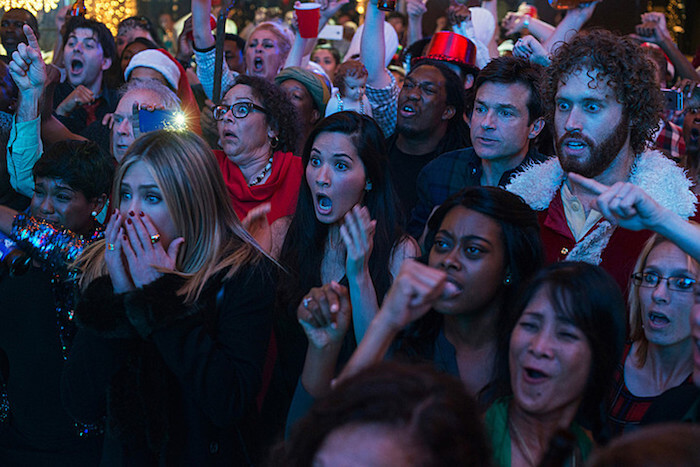Office Christmas Party and the HR Disaster Movie
 Office Christmas Party
Office Christmas Party
Directed by Josh Gordon and Will Speck
Opens December 9
It is a dilemma I’m not sure has occurred to the team behind Office Christmas Party: To stock an office’s worth of funny characters, the movie must hire a litany of comic ringers, even for minor roles, yet to convey white-collar doldrums they’ve also turned to a ton of people who have spent most of their professional lives being hilarious, not stewing near a copy machine. Of course, that’s a little bit presumptuous; I’m sure there’s at least some temp experience among, say, T.J. Miller, Rob Corddry, Vanessa Bayer, Kate McKinnon, Randall Park, Sam Richardson, Jillian Bell, and Karan Soni, and if there isn’t, I’m not one to complain about seeing them all on the big screen. But it’s an early signal that this likable and thoroughly amusing comedy will not be an heir to Office Space or TV’s The Office, which had their cartoony moments, but zero scenes (that I can recall) where employees jousted with fiery Christmas trees atop shopping carts.
What this movie basically is, is a feature-length version of a Saturday Night Live bit—literally, though uncredited. Two years ago, perpetual toast of awards season Amy Adams appeared in a music video that wasn’t quite as good as its predecessors like “Twin Bed” or “Back Home Baller” or even its 2016 successor “Crucible Cast Party,” but did offer the sight of SNL staffers ably impersonating office drones cutting a nerdy, sloppy kind of loose. That’s what Office Christmas Party: The Movie does, and even hires Kate McKinnon (as an uptight HR manager) and the delightful Vanessa Bayer (as an ultra-efficient if sometimes profane administrator) in what feels like a legal-department concession, albeit a welcome one.
Anyway: An office holiday gathering spirals way out of control. That’s basically the joke, although Office Christmas Party dresses it up with some Horrible Bosses tinsel by bringing in that movie’s Jason Bateman and Jennifer Aniston, also alumni of the ill-fated comedy The Switch, the last effort from directing team Josh Gordon and Will Speck. Their first film, Blades of Glory, was basically an off-brand but frequently hilarious Will Ferrell absurdathon; The Switch was supposed to be more grounded and heartfelt; and now Office Christmas Party kinda-sorta splits the difference. Bateman plays the second-in-command at a firm that designs, produces, and sells servers; Aniston is the interim CEO of the parent company, while her slacker brother (T.J.Miller) runs Bateman’s Chicago branch. Fired up to clinch her CEO birthright and punish the brother who always seems to skate by, Aniston announces that she will lay off forty percent of the Chicago branch’s workforce for only meeting, and not exceeding, their seven-percent-growth goals.
This detail, I admit, rings true—that layoffs can loom not just for failing businesses, but for ones that aren’t succeeding wildly enough. This notion isn’t given much satirical back-up by Aniston, who as in Horrible Bosses has been cast as a coldhearted villain in a way that’s supposed to delightfully toy with her girl-next-door image. Except: Has Jennifer Aniston ever actually, successfully played a girl next door? (Recall that her Friends character came from money.) Or rather, has she ever played a girl next door who didn’t seem at minimum, kind of tediously put-upon, and at her worst, deeply self-pitying? She’s not especially great in her second act as a ball-buster, either; I’ve never understood her supposed gift of comic timing beyond the sitcom where at least half the ensemble had a greater knack.
But this isn’t Aniston’s movie. A core team of Miller, Bateman, and genius programmer Olivia Munn decide to try saving the branch by courting a big-time client (Courtney B. Vance) at a blowout Christmas party, even though Aniston has just canceled the wine-and-cheese gathering meticulously planned and supervised by McKinnon’s HR weirdo. McKinnon is very funny, though she’s flirting with the pitfalls her Ghostbusters co-star Melissa McCarthy faces in her weakest roles: amalgamating goofy quasi-WTF tics rather than creating a coherent character.
Mayhem ensues, some of it impressively imagined and staged, especially when the camera leaves the office for a minute or two and always returns to find the craziness further escalating. The writing credits practically warrant their own HR department and tech support team: The team of six includes three on story (the Hangover and Bad Moms screenplay team plus Sandler part-timer and “story by” stalwart Timothy Dowling) and three on actual screenplay (Sacha Baron Cohen cohort Dan Mazer, and sitcom writers Laura Solon and Justin Malen). But the scattershot approach works well enough both in little tangents like Jillian Bell’s work as a stressed-out pimp and main-attraction goofiness like Miller’s whole deal playing a boss who truly loves his employees and knows almost nothing else about business or even, sometimes, the basics of human interaction.
The raunchy-but-sweet R-rated comedy is a difficult formula to master; so often the raunch turns sour and the sweetness turns to treacle, and quotidian settings like a “normal” office tend to bring out the nastiness in comedy filmmakers. But Office Christmas Party really is pretty good-natured, even in its wackiest debauchery. Gordon and Speck aren’t masterful stagers of gags, but they’re relatively concise; even at a slightly overlong 105 minutes, Office Christmas Party hustles along (by way of contrast, its upcoming fellow holiday comedy Why Him? is only ten minutes longer, but feels like it goes on for at least another twenty beyond that).
These guys make movies that feel like they should be goosed by Apatow-style improv lines (and end-credits outtakes here reveal a few lines as such, like Miller’s purported college major of “Canadian television theory, with a concentration in Drake”) but usually aren’t, or at least not by a lot of memorable McKay/Ferrell-style run-ons. The lack of really big laughs may in this case be the tradeoff for briskness. The lack of a satirical edge has a less technical excuse: It’s just a Hollywood studio comedy, trying its best to get laughs without raising anyone’s game. The strategy does work—and almost in spite of itself, Office Christmas Party does tap into some kind of pent-up HR-suppressed energy, however broadly. Miller, Bateman, and Munn turn the office into the new frat house, and if that’s not exactly a fresh innovation for bro-centric comedy—and, also, a weird, vaguely depressing presumption of wish fulfillment to the idea that 200 employees are really itching to rage into the wee hours at work—it is at least funnier than a frat house being a frat house.
You might also like 



















